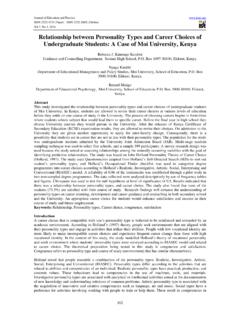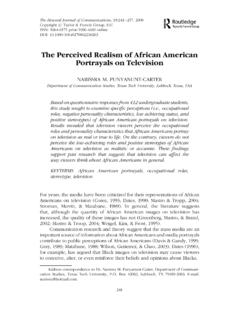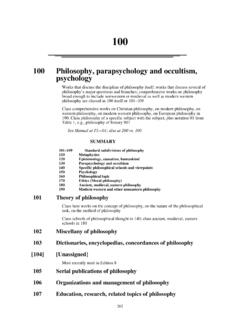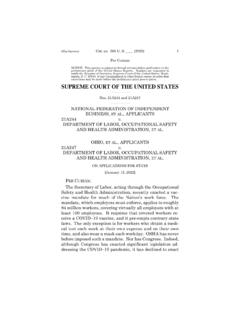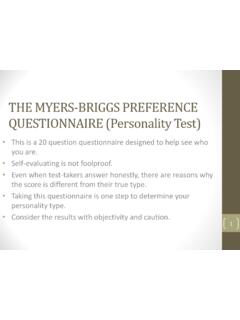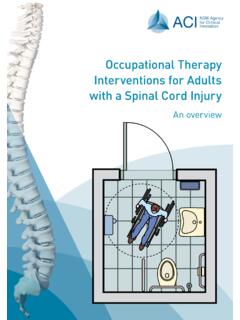Transcription of Mnemonics in a mnutshell: 32 aids to psychiatric diagnosis
1 Current PsychiatryVol. 7, No. 1027 Mnemonics in a mnutshell: 32 aids to psychiatric diagnosis Clever, irreverent, or amusing, a mnemonic you rememberis a lifelong learning tool Jason P. Caplan, MDAssistant clinical professor of psychiatryCreighton University School of MedicineOmaha, NEChief of psychiatrySt. Joseph s Hospital and Medical CenterPhoenix, AZTheodore A. Stern, MDProfessor of psychiatryHarvard Medical SchoolChief, psychiatric consultation serviceMassachusetts General HospitalBoston, MAFrom SIG: E CAPS to CAGE and WWHHHHIMPS, Mnemonics help practitioners and trainees recall important lists (such as criteria for depression, screening questions for alcoholism, or life-threatening causes of delirium, respectively). Mnemonics effi cacy rests on the principle that grouped information is easi-er to remember than individual points of data. Not everyone loves Mnemonics , but recollecting diagnostic criteria is useful in clinical practice and research, on board examinations, and for insurance reimbursement.
2 Thus, tools that assist in recalling di-agnostic criteria have a role in psychiatric practice and teaching. In this article, we present 32 Mnemonics to help cli-nicians diagnose: affective disorders (Box 1, page 28)1,2 anxiety disorders (Box 2, page 29)3-6 medication adverse effects (Box 3, page 29)7,8 personality disorders (Box 4, page 30)9-11 addiction disorders (Box 5, page 32)12,13 causes of delirium (Box 6, page 32).14 We also discuss how Mnemonics improve one s memory, based on the principles of learning Mnemonics workA mnemonic from the Greek word mnemonikos ( of memory ) links new data with previously learned information. Mnemonics assist in learning by reducing the amount of information ( cognitive load ) that needs JUPITER IMAGES27_CPSY1008 2727_CPSY1008 279/12/08 3:20:58 PM9/12/08 3:20:58 PMCopyright Dowden Health Media For personal use onlyFor mass reproduction, content licensing and permissions contact Dowden Health PsychiatryOctober 200828 MnemonicsBOX 1.
3 Mnemonics FOR DIAGNOSING AFFECTIVE DISORDERSD epressionSIG: E CAPS*Suicidal thoughtsInterests decreasedGuiltEnergy decreasedConcentration decreasedAppetite disturbance (increased or decreased)Psychomotor changes (agitation or retardation)Sleep disturbance (increased or decreased)* Created by Carey Gross, MDDysthymiaHE S 2 SAD2 HopelessnessEnergy loss or fatigueSelf-esteem is low2 years minimum of depressed mood most of the day, for more days than notSleep is increased or decreasedAppetite is increased or decreasedDecision-making or concentration is impairedManiaDIG FASTD istractibilityIndiscretionGrandiosityFli ght of ideasActivity increaseSleep defi citTalkativenessDepressionC GASP DIE1 Concentration decreasedGuiltAppetiteSleep disturbancePsychomotor agitation or retardationDeath or suicide (thoughts or acts of)Interests decreasedEnergy decreasedHypomaniaTAD HIGH TalkativeAttention defi citDecreased need for sleepHigh self-esteem/grandiosityIdeas that raceGoal-directed activity increasedHigh-risk activityManiaDeTeR the HIGH*DistractibilityTalkativenessReckles s behaviorHyposomniaIdeas that raceGrandiosity Hypersexuality* Created by Carey Gross, MDto be stored for long-term processing and Memory, defi ned as the persistence of learning in a state that can be revealed at a later time, 16 can be divided into 2 types: declarative (a conscious recollection of facts, such as remembering a relative s birthday) procedural (skills-based learning, such as riding a bicycle).
4 Declarative memory has a conscious component and may be mediated by the medial temporal lobe and cortical associa-tion structures. Procedural memory has less of a conscious component; it may involve the basal ganglia, cerebellum, and a variety of cortical sensory-perceptive memory can be subdivided into working memory and long-term memory. With working memory, new items of infor-mation are held briefl y so that encoding and eventual storage can take place. Working memory guides decision-making and future planning and is intri-cately related to Functional MRI and positron emission tomography as well as neurocognitive testing have shown that working memory tasks ac-tivate the prefrontal cortex and brain regions specifi c to language and visuo-spatial memory. The hippocampus is thought to rapidly absorb new information, and this data is consolidated and permanently stored via the prefrontal Given the hippo-campus limited storage capacity, new infor-mation (such as what you ate for breakfast 3 weeks ago) will disappear if it is not re-peated 2828_CPSY1008 289/12/08 3:21:03 PM9/12/08 3:21:03 PMCurrent PsychiatryVol.
5 7, No. 1029 Clinical PointTKTKC linical PointTKTKBOX 2. Mnemonics FOR DIAGNOSING ANXIETY DISORDERSLong-term memory, on the other hand, is encoded knowledge that is linked to facts learned in the past; it is consolidated in the brain and can be readily studies have demonstrat-ed opposing patterns of activation in the hippocampus and prefrontal cortex, de-pending on whether the memory being recalled is: new (high hippocampal activity, low prefrontal cortex activity) old (low hippocampal activity, high prefrontal cortex activity).27 Mnemonics are thought to affect working memory by reducing the introduced cog-nitive load and increasing the effi ciency of memory acquisition and encoding. They reduce cognitive load by grouping ob-jects into a single verbal or visual cue that can be introduced into working memory. Learning is optimized when the load on BOX 3. Mnemonics FOR DIAGNOSING MEDICATION ADVERSE EFFECTSA ntidepressant discontinuation syndromeFINISH7 Flu-like symptomsInsomniaNauseaImbalanceSensory disturbancesHyperarousal (anxiety/agitation)Neuroleptic malignant syndromeFEVER8 FeverEncephalopathyVital sign instabilityElevated WBC/CPKR igidityWBC: white blood cell countCPK: creatine phosphokinaseSerotonin syndromeHARMEDH yperthermiaAutonomic instabilityRigidityMyoclonusEncephalopat hyDiaphoresisClinical PointTKTKG eneralized anxiety disorderWorry WARTS3 Wound upWorn-outAbsentmindedRestlessTouchySlee plessPosttraumatic stress disorderTRAUMA5 Traumatic eventRe-experienceAvoidanceUnable to functionMonth or more of symptomsArousal increasedAnxiety disorder due to a general medical conditionPhysical Diseases That HaveCommonly Appeared Anxious.
6 Pheochromocytoma Diabetes mellitus Temporal lobe epilepsy Hyperthyroidism Carcinoid Alcohol withdrawal ArrhythmiasGeneralized anxiety disorderWATCHERS4 WorryAnxietyTension in musclesConcentration diffi cultyHyperarousal (or irritability)Energy lossRestlessnessSleep disturbancePosttraumatic stress disorderDREAMS6 Disinterest in usual activitiesRe-experienceEvent preceding symptomsAvoidanceM onth or more of symptomsSympathetic arousal29_CPSY1008 2929_CPSY1008 299/16/08 12:06:16 PM9/16/08 12:06:16 PMCurrent PsychiatryOctober 200830 MnemonicsBOX 4. Mnemonics FOR DIAGNOSING personality DISORDERS working memory is minimized, enabling long-term memory to be Mnemonics may use rhyme, music, or visual cues to enhance memory. Most mne-monics used in medical practice and edu-cation are word-based, including: Acronyms words, each letter of which stands for a particular piece of information to be recalled (such as RICE for treatment of a sprained joint: rest, ice, compression, elevation).
7 Acrostics sentences with the fi rst let-ter of each word prompting the desired recollection (such as To Zanzibar by mo-tor car for the branches of the facial nerve: temporal, zygomatic, buccal, mandibular, cervical). Alphabetical sequences (such as ABCDE of trauma assessment: airway, breathing, circulation, disability, exposure).29An appropriate teaching tool?Dozens of Mnemonics addressing psychi-atric diagnosis and treatment have been published, but relatively few are widely used. psychiatric educators may resist teaching with Mnemonics , believing they might erode a humanistic approach to pa-tients by reducing psychopathology to a laundry list of symptoms and the art of psychiatric diagnosis to a check-box en-deavor. Mnemonics that use humor may be rejected as irreverent or Publishing a novel mnemonic may be viewed with disdain by some as an easy way of padding a curriculum vitae.
8 Entire Web sites exist to share mnemon-ics for medical education (see Related Resources, page 33). Thus it is likely that trainees are using them with or without their teachers supervision. psychiatric ed-Paranoid personality disorderSUSPECT9 Spousal infi delity suspectedUnforgiving (bears grudges)SuspiciousPerceives attacks (and reacts quickly)Enemy or friend? (suspects associates and friends)Confi ding in others is fearedThreats perceived in benign eventsSchizotypal personality disorderME PECULIAR9 Magical thinkingExperiences unusual perceptionsParanoid ideationEccentric behavior or appearanceConstricted or inappropriate affectUnusual thinking or speechLacks close friendsIdeas of referenceAnxiety in social situationsRule out psychotic or pervasive developmental disordersBorderline personality disorderIMPULSIVE10 ImpulsiveMoodinessParanoia or dissociation under stressUnstable self-imageLabile intense relationshipsSuicidal gesturesInappropriate angerVulnerability to abandonmentEmptiness (feelings of)
9 Schizoid personality disorderDISTANT9 Detached or fl attened affectIndifferent to criticism or praiseSexual experiences of little interestTasks done solitarilyAbsence of close friendsNeither desires nor enjoys close relationshipsTakes pleasure in few activitiesAntisocial personality disorderCORRUPT9 Cannot conform to lawObligations ignoredReckless disregard for safetyRemorselessUnderhanded (deceitful)Planning insuffi cient (impulsive)Temper (irritable and aggressive)Borderline personality disorderDESPAIRER*Disturbance of identityEmotionally labileSuicidal behaviorParanoia or dissociationAbandonment (fear of)ImpulsiveRelationships unstableEmptiness (feelings of)Rage (inappropriate)* Created by Jason P. Caplan, MD30_CPSY1008 3030_CPSY1008 309/12/08 3:21:12 PM9/12/08 3:21:12 PMCurrent PsychiatryVol. 7, No. 1031ucators need to be aware of the Mnemonics their trainees are using and to: screen these tools for factual errors (such as incomplete diagnostic criteria) remind trainees that although mne-monics are useful, psychiatrists should ap-proach patients as individuals without the prejudice of a potentially pejorative label.
10 Our methodologyIn preparing this article, we gathered numerous Mnemonics (some published and some novel) designed to capture the learner s attention and impart informa-tion pertinent to psychiatric diagnosis and treatment. Whenever possible, we credited each mnemonic to its creator, but given the diffi culty in confi rming authorship of (what in many cases has become) oral his-tory we ve listed some Mnemonics with-out citation. Our list is far from complete because we likely are unaware of many Mnemonics , and we have excluded some that seemed obscure, unwieldy, or redundant. We have not excluded Mnemonics that some may view as pejorative but merely report their existence. Including them does not mean that we endorse them. This article lists 32 Mnemonics related to psychiatric diagnosis . Thus, it seems odd that an informal survey of >60 resi-dents at the Massachusetts General Hos-pital (MGH)/McLean Residency Training Program in Psychiatry revealed that most were aware of only 2 or 3 psychiatric mne-monics, typically: SIG.

